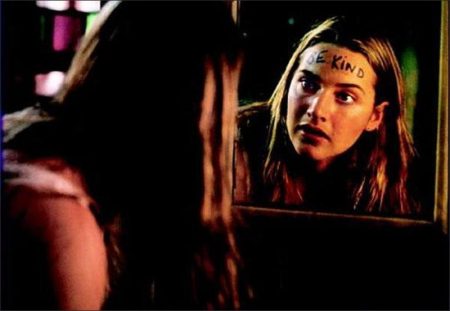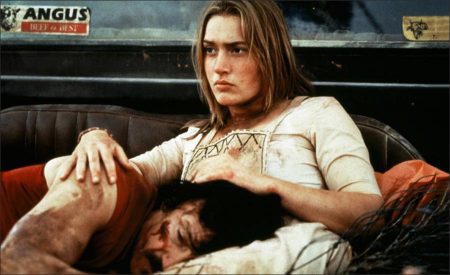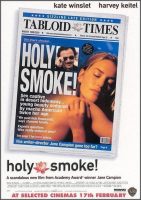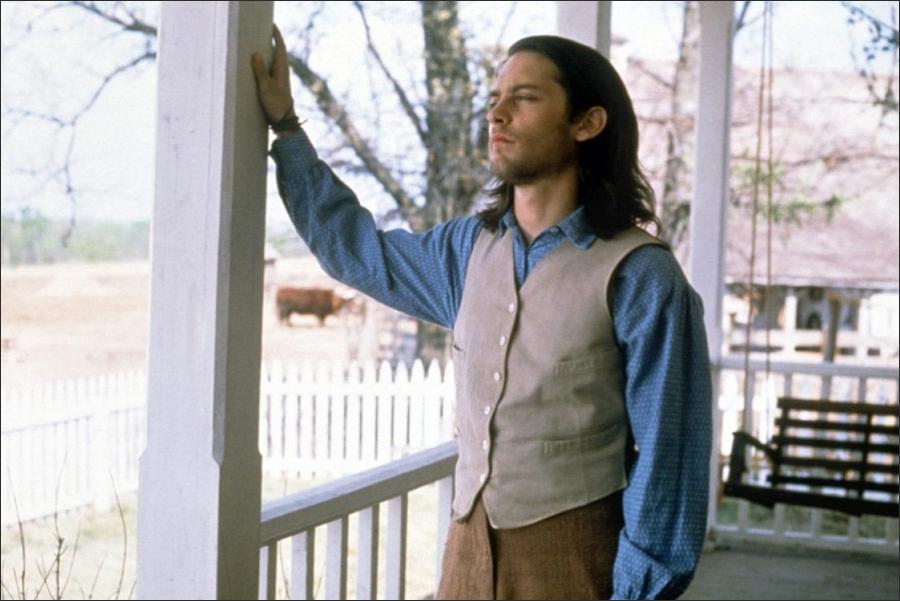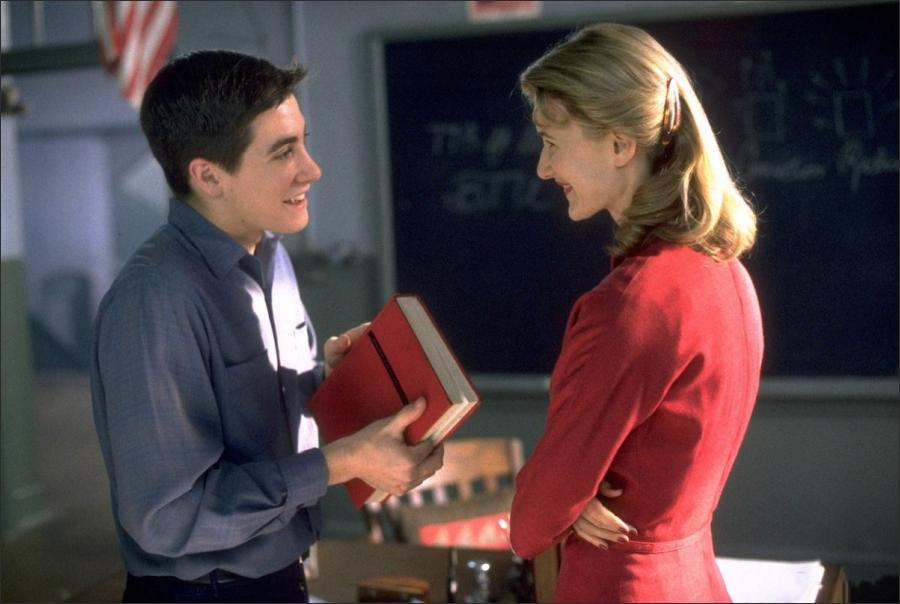Taglines: He had only one thing on his mind… but so did she!
Holy Smoke! movie storyline. It’s said that sex and religion are two subjects that no one can discuss without arguing; writer/director Jane Campion tackles both head-on in this satiric comedy drama. On a trip to India, Australian Ruth (Kate Winslet) has a spiritual awakening and embraces the teachings of a guru named Baba. Back home in Sydney, Ruth’s mother and father (Julie Hamilton and Tim Robertson) are appalled to learn that their daughter now answers to the name Nazni and has no intention of returning.
Mother visits her daughter in India in hopes of convincing her to come home, but it’s not until she suffers a life-threatening asthma attack that Ruth agrees to return for a visit. Mother pretends to arrange a meeting with Ruth’s father, who has been ill, and this trick lands Ruth in the clutches of P.J. Waters (Harvey Keitel), an American exit counselor who deprograms members of religious cults.
Waters begins to loosen Ruth’s belief in Baba’s teachings, but P.J. finds himself sexually attracted to Ruth, and in time she allows him to seduce her. Ruth soon turns the tables on P.J., as she discovers that sex allows her to make mincemeat of his long-held beliefs as a macho, misogynist male. Jane’s sister Anna Campion, herself a director, co-authored the screenplay; Pam Grier appears in a supporting role as P.J.’s partner and girlfriend.
Holy Smoke! is a 1999 Australian drama film directed by Jane Campion, who co-wrote the screenplay with her sister Anna. It premiered at the 56th Venice International Film Festival and was shown at the New York Film Festival and the Taipei Golden Horse Film Festival before being released theatrically.
The film was made on location in Paharganj in Delhi and Pushkar in India and Sydney and Hawker in the Flinders Ranges in South Australia. Interiors were filmed at Fox Studios Australia. Angelo Badalamenti’s soundtrack is performed by artists including Annie Lennox, Alanis Morissette, Burt Bacharach, Neil Diamond and Chloe Goodchild.
Holy Smoke! grossed $1,380,029 at the box office in Australia. The film grossed $1,758,780 in the US and $1,821,943 in foreign markets for a worldwide box office of $3,580,723.
Film Review for Holy Smoke!
“Holy Smoke” begins as a movie about the deprogramming of a cult member and ends with the deprogramming of the deprogrammer. It’s not even a close call. The cult member is Ruth (Kate Winslet), an Australian who has gone to India and allied herself with a guru. And the deprogrammer is Harvey Keitel, summoned by Ruth’s parents; he stalks off the plane like his no-nonsense fix-it man in “Pulp Fiction” and then starts falling to pieces. The movie leaves us wondering why the guru didn’t become Ruth’s follower, too.
The film isn’t really about cults at all, but about the struggle between men and women, and it’s a little surprising, although not boring, when it turns from a mystic travelogue into a feminist parable. The director is Jane Campion (“The Piano”), who wrote the screenplay with her sister Anna. Like so many Australian films (perhaps even a majority), “Holy Smoke” suggests that everyone in Australia falls somewhere on the spectrum between goofy and eccentric, none more than characters invariably named Mum and Dad.
Parents are totally unhinged beneath a facade of middle-class conventionality; their children seem crazy, but like many movie mad people, are secretly saner than anyone else. Campion’s first film, “Sweetie,” was an extreme example; “Holy Smoke” reins in the strangeness a little, although to be sure there’s a scene where Keitel wanders the outback wearing a dress and lipstick, like a passenger who fell off “The Adventures of Priscilla, Queen of the Desert.”
Ruth, the Winslet character, journeys to India and falls under the sway of a mystic guru. Her parents trick her into returning, and hire P.J. Waters (Keitel) to fly over from the United States and deprogram her. At this point I was hoping perhaps for something like “Ticket to Heaven” (1981), the powerful Canadian film about the struggle for a cult member’s mind. But no. The moment Ruth and P.J. face off against each other, their struggle is not over cult beliefs, but about the battle between men and women. And P.J., with his obsolete vocabulary of sexual references, is no match for the strong-willed young woman who overwhelms him mentally, physically and sexually.
Winslet and Keitel are both interesting in the film, and indeed Winslet seems to be following Keitel’s long-standing career plan, which is to go with intriguing screenplays and directors and let stardom take care of itself. That may mean he doesn’t get paid $20 million a picture, but $20 million roles, with rare exceptions, are dogs anyway–because they’ve been chewed over and regurgitated by too many timid executives. A smaller picture like this, shot out of the mainstream, has a better chance of being quirky and original.
And quirky it is, even if not successful. Maybe it’s the setup that threw me off. Ruth comes onscreen as one kind of person–dreamy, escapist, a volunteer for mind-controlling beliefs–and then turns into an articulate spokeswoman for Jane and Anna Campion’s ideas. It’s also a little disappointing that the film didn’t penetrate more deeply into the Indian scenes, instead of using them mostly just as setup for the feminist payoff.
And it’s difficult to see how the Ruth at the end of the film could have fallen under the sway of the guru at the beginning. Not many radical feminists seek out male gurus in patriarchal cultures.
Holy Smoke! (1999)
Directed by: Jane Campion
Starring: Kate Winslet, Harvey Keitel, Julie Hamilton, Sophie Lee, Dan Wyllie, Paul Goddard, Tim Robertson, Les Dayman, George Rafael, Samantha Murray, Kerry Walker
Screenplay by: Anna Campion, Jane Campion
Production Design by: Janet Patterson
Cinematography by: Dion Beebe
Film Editing by: Veronika Jenet
Costume Design by: Janet Patterson
Set Decoration by: Rebecca Cohen, Lisa Thompson
Art Direction by: Tony Campbell
Music by: Angelo Badalamenti
MPAA Rating: R for strong sexuality and language.
Distributed by: Miramax Films
Release Date: December 26, 1999
Views: 222
